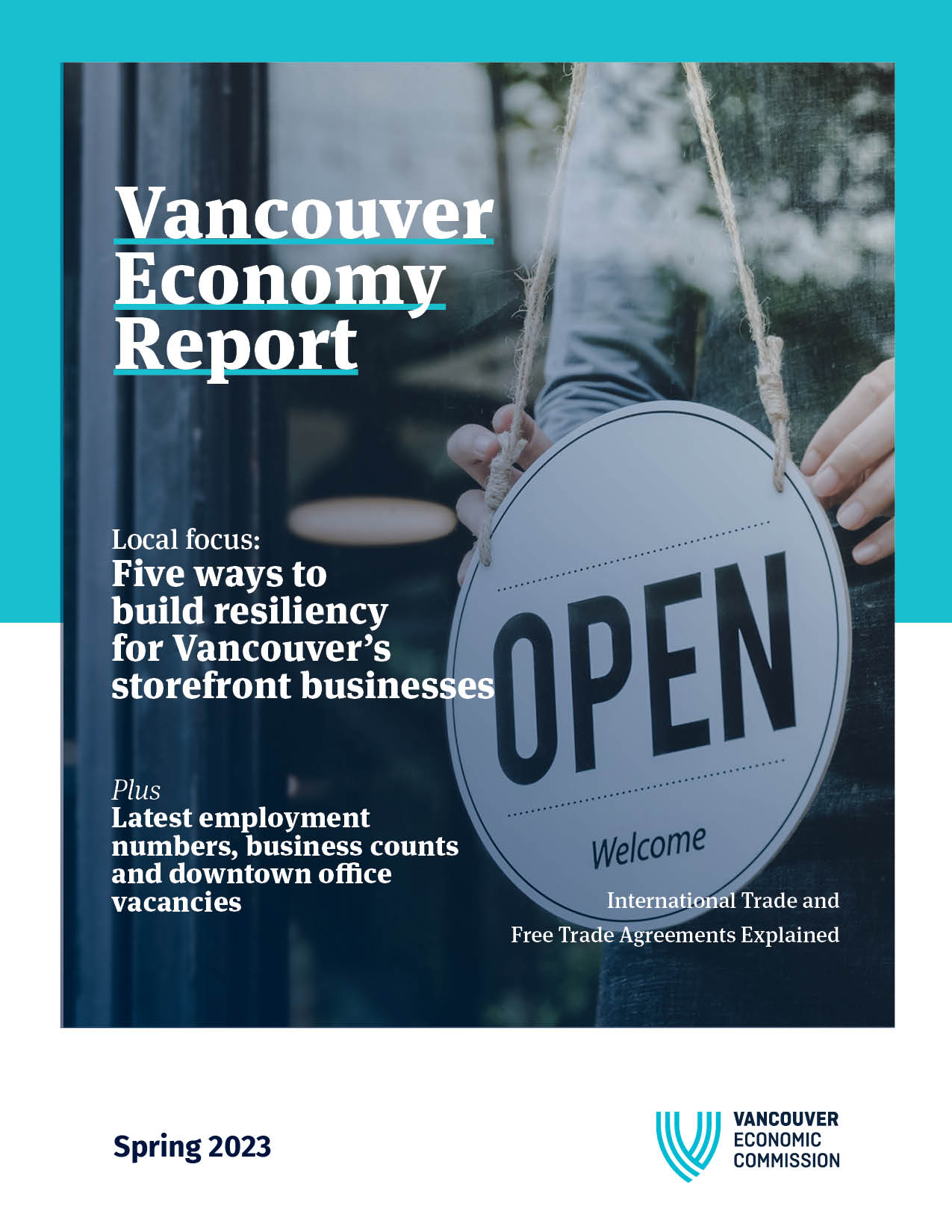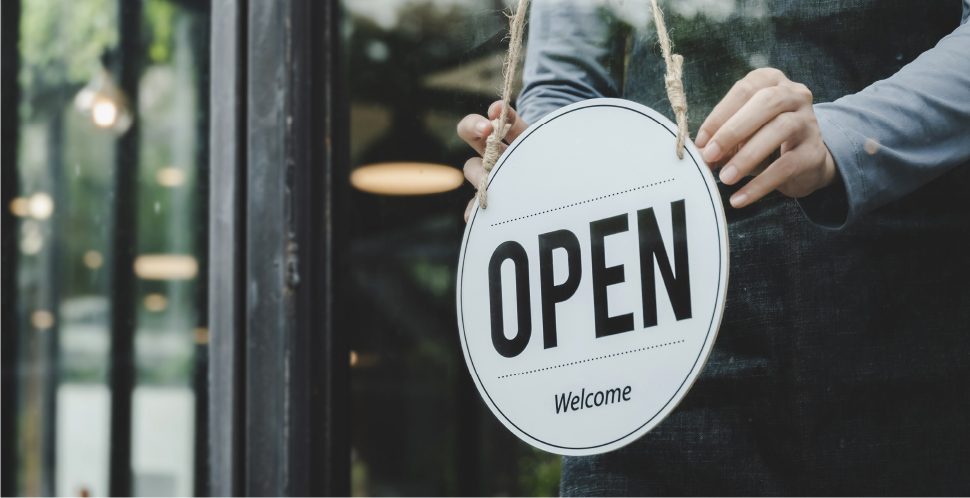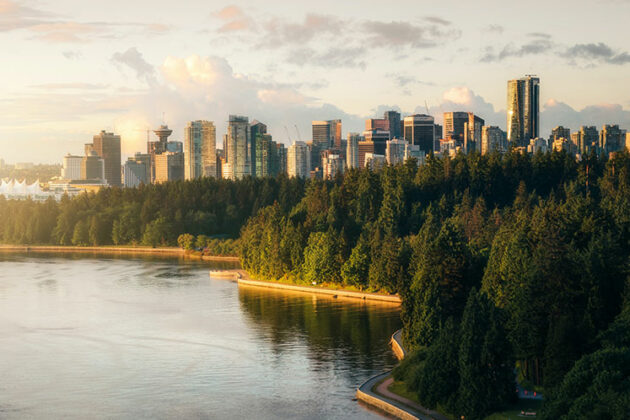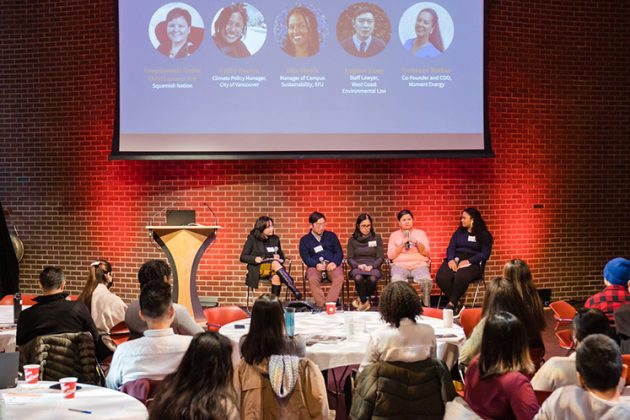Storefront businesses play a crucial role in building a sense of place and community
City-wide high street vacancy rate
approx. jobs in Vancouver
increase in retail sales in Metro Vancouver
Storefront businesses refer to establishments with a physical bricks-and-mortar location. Vancouver’s distinctive high streets and storefront neighbourhoods are vibrant contributors to building culturally, economically, and socially distinct communities that draw locals and international visitors.
Although these businesses are viewed as being retail- and commercial-oriented, they can also support industrial, community and arts activities. They are cafés, restaurants, beauty salons, stationery stores, electronics shops, tailors, public houses, thrift shops and galleries; they are where residents go for dining, entertainment, cultural experiences, shopping and repair services.
10 ways to build resiliency for Vancouver’s storefront businesses
The following suggestions are not ranked in any particular order, and are not written with any one audience in mind. Those who can take action on them include multiple orders of government, BIAs, entrepreneurs and business advocates.
The key is to think about the role the storefronts we walk by every day play in our individual lives – and in the broader picture of our city’s culture and economy.
1. Activate storefront businesses around major events
2. Activate underused storefronts
3. Retain and revitalize heritage businesses
4. Activate the public realm with art and programming to enhance the experiences of high streets
5. Support business owners with digitalization and multiplatform sales or service options
6. Continue permitting process improvements at City of Vancouver
7. Support businesses with meaningfully adopting zero-carbon practices
8. Support BIAs and businesses with funding to manage graffiti and petty crime
9. Shop local
10. Advocate for better data with which to act upon
1. Activate storefront businesses around major events
The success of storefront businesses in Vancouver is intertwined with numerous industries, including tourism, accommodation, retail, hospitality, transportation, and major events.
Major events can drive enormous volumes of visitors and economic activity. Street, cultural and music festivals are also a prime method of driving visitor traffic to high streets.
Cultural celebrations and parades, such as the Vancouver Pride and Lunar New Year parades, can also draw annual crowds to neighbourhoods like Davie Street and Chinatown.
Local Spotlight
Destination Vancouver showcases Vancouver’s storefront businesses to the visitor economy and locals alike, producing annual events including Dine Out Vancouver Festival.
Sport Hosting Vancouver is an industry-funded department in the City of Vancouver that proactively attracts large events that help stimulate visits, spending and placemaking.
Car Free Day Vancouver is a not-for-profit that organizes street parties along Main Street, Denman Street, and Commercial Drive.

2. Activate underused storefronts
According to the City of Vancouver’s annual storefront business inventory, the city-wide vacancy rate was 11.9% in 2022, a marginal improvement of the 12.1% recorded in 2021 (-0.2%). Many storefronts are vacant because they are unleased; however, many more are underused because the space operator or business itself may be awaiting a new tenant or for renovation permits to come through.
However, not all activations are equal: while activating these spaces with seasonal pop-ups can drive customer foot traffic, activations are also capable of meeting higher social, community and cultural uses.
Local Spotlight
The Vancouver Mural Festival Residency Program is a pilot project delivered by Hessey Consulting + Architecture that creates temporary artist studio and exhibition spaces for IBPOC and emerging artists by activating underused storefronts.
3. Retain and revitalize heritage businesses
Heritage businesses can be defined as businesses with history. Some of them may be family-owned enterprises or practices passed from generation to generation and have longstanding traditions and practices. These companies can have huge impacts on creating or maintaining a neighbourhood’s distinct identity. However, they may face additional pressures that newer enterprises do not.
Older businesses have had to adapt to everything from contactless payment to delivery and e-commerce. They may struggle to appeal to new customers or be caught up in gentrification or seismic shifts in their neighbourhood’s character.
Local Spotlight
The City of Vancouver’s Special Enterprise Program (SEP) is a five-year pilot project that supports the Vancouver Chinatown Foundation and Community Impact Real Estate Society (CIRES) with launching programs to support the retention of heritage businesses while addressing vacant storefronts in the Downtown Eastside.
An early success story of SEP is the refurbishment and revitalization of Kam Wai Dim Sum, with support from the Strathcona Business Improvement Association and Dunefield Consulting.
4. Activate the public realm with art and programming to enhance the experiences of high streets
When we refer to the public realm, we refer to the public gathering places – plazas, playgrounds, parks, green spaces. Done right, placemaking initiatives like public art and installations and programming can make high streets more attractive, memorable, and inviting by providing a sense of familiarity, comfort, and community. Well-planned initiatives provide additional benefits by increasing foot traffic because it helps create unique experiences for visitors and locals.
Public programming tied to routine or seasonal events, such as weekly live music performances in the summer (e.g. CBC Musical Nooners or Roundhouse Community Centre’s Live Music and Storytelling) could encourage people who attend the event to stay in the area, contributing to economic activity.
Local Spotlight
VIVA Vancouver is a City of Vancouver initiative that transforms streets and public spaces into vibrant, people-friendly places. It uses events and space activation initiatives like public plazas, community markets, sharing libraries and even street-side piano installations to cultivate social connections and promote healthier, vibrant cities.
The Vancouver Mural Festival employs artists – with attention to artists from underrepresented populations – to beautify buildings, alleys and other public spaces.
5. Support business owners with digitalization and multiplatform sales or service options
Digitalization refers to systems transformation from analog to digital. Internet and web infrastructure has almost universally shifted the way people manage information, including information, logistics, payrolls, correspondence, and points of sale.
Although many storefront businesses today continue to operate using legacy or analog systems, digitalization can increase the resilience of a business by improving efficiency, reach, and agility or quality of client, guest and consumer services. Not all businesses can afford the time or financial investments necessary to digitalize, but resources are available for those who need support.
Local Spotlight
Small Business BC (SBBC) manages the Canada Digital Adoption Program (CDAP) to support businesses with micro-grants, e-commerce advisory support and improved digital strategies to help small businesses build resilience in the digital era.
Simon Fraser University’s Digital Innovation and Leadership (DIAL) initiative aims to provide professional education to prepare Canadian businesses for the digital economy.

6. Continue permitting process improvements at City of Vancouver
Improving the predictability and timeliness of business license approvals or development permitting for small businesses makes a huge difference in building a supportive operating environment for storefront businesses.
Permit processing delays of any kind can be great cost burdens because they can negatively impact a shop’s timely opening, relocation, or renovation. For many small businesses operating on slim margins, this can be a death knell, causing costs to snowball while sparking logistical challenges.
Local Spotlight
The City of Vancouver has made managing, streamlining, digitizing and otherwise improving the permitting experience an ongoing priority through its Permitting Improvement Program.
Small businesses planning renovations or looking to move and start businesses in Vancouver can receive support from the City’s Small Business Commercial Renovation Centre (CRC).
7. Support businesses with meaningfully adopting zero-carbon practices
Today, every business is operating in a policy and market context that’s driving towards net zero. Small, storefront businesses selling retail goods are often on the receiving end of the movements of larger businesses – like their goods suppliers –and the governments that surround them.
Ultimately, the consumer and political commitment to net zero is growing – even in the face of recession and inflation. Storefront businesses that draw on government support and incentives and those that learn to quickly innovate will ultimately come out ahead.
NGOs, governments, and business owners and operators themselves must navigate this new market environment. For more information, refer to VEC’s Zero Emissions Economic Transition Action Plan (ZEETAP).
Local Spotlight
BMO Radicle helps businesses understand, track and reduce their emissions in order to improve their accountability.
Ostrom Climate works with businesses to quantify and manage their carbon footprints and support them in taking measurable climate actions.
8. Support BIAs and businesses with funding to manage graffiti and petty crime
BIAs and their business community stakeholders place a strong emphasis on managing cleanliness. Proactively managing graffiti, litter, sharps and vandalism can help to sustain a safe and welcoming environment a sense of safety and community pride, avert break-ins, and reduce health risks.
Criminalized behaviours and associated indicators of urban neglect are caused by deep and systemic issues, including mental health, housing, cost-of-living, and exacerbated by the toxic drug crises plaguing many urban centres in North America.
With no easy solutions to these crises, businesses in most neighbourhoods continue to request financial support from BIAs and governments to help manage these issues, including the installation of more security camera systems, increased street-level presence of safety ambassadors and community-based policing, security officers, beautification and repair, and proactive waste removal.
Local Spotlight
The Downtown Vancouver BIA’s Storefront Security Grant is a first-of-its-kind program that provides financial relief to business projects related to graffiti removal, repairing of damaged storefronts, and installing security measures like camera systems and storefront gates within the downtown Vancouver business improvement area.

9. Shop local
Storefront businesses owned and operated by multinational, franchise or chain businesses can serve as community and anchor tenants in commercial properties and among high streets. However, small-to-medium independent businesses also play a critical role in the economy.
A 2019 LOCO BC Indie Impact Study demonstrated that every dollar spent at local businesses can recirculate up to $0.63 in the community – this is 4.6 times the average return of money spent at non-local businesses. The same study found that dollars spent at local restaurants have twice the impact as those spent at those of multinational chains (67.9% over 30.4%).
With e-commerce, unstable supply chains and inflation applying pressure to local businesses, consider shopping in person at your favourite local vendors. And, if you’re in charge of procurement at your own organization or business, please give some thought to your procurement practices!
Local Spotlight
LOCO BC leverages research to monitor the health of local independent businesses and encourage BC residents and businesses to purchase from local independent businesses.
10. Advocate for better data with which to act upon
Storefront businesses are a significant and diverse employer: the Vancouver Economic Commission estimates that storefront businesses across the city collectively employ about 60,000 workers, and that the sector could add as many as 20,000 more jobs in the city from now through to 2032.
Our team calculates this based on municipal data available on jobs in the retail and food sectors, business data from Statistics Canada, and insights from the Province of British Columbia’s labour force survey.
However, we acknowledge that in terms of hard numbers, our knowledge is spotty: there is no reliable way to gauge the true health of this industry segment, which spans numerous sectors, and is further complicated by location-specific filters.
Local Spotlight
The City of Vancouver’s Annual Storefront Inventory survey documents changes in storefront businesses, with an emphasis on businesses that can be seen from street level and accessed by retail (non-trade) clients. The project team shares its preliminary survey counts with each BIA to validate observed trends and insights.
The annual storefront inventory becomes more comprehensive with each iteration. The next storefront inventory count commences in March 2023, and will be published later in 2023.

The Vancouver Economy Report
A version of this article was published in our storefront businesses industry feature in the Spring 2023 Vancouver Economy Report. For more stories on Vancouver’s economy and on storefront businesses, be sure to check out that issue, and to subscribe today.
Read the Report



